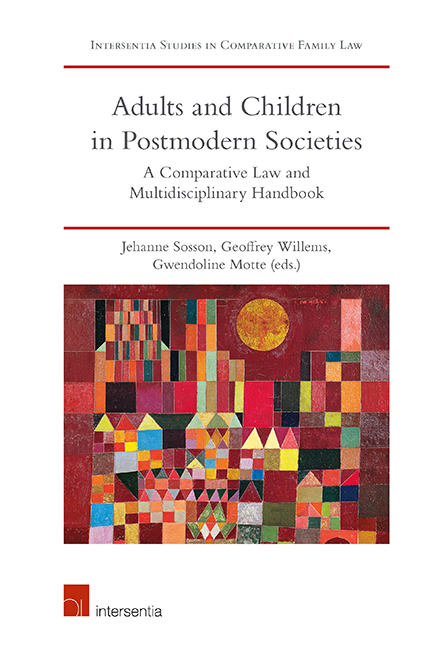Book contents
- Frontmatter
- Contents
- List of Cases
- List of Contributors
- Introduction
- PART I NATIONAL REPORTS ON LEGAL REGULATIONS OF RELATIONSHIPS BETWEEN ADULTS AND CHILDREN
- Questionnaire
- Models
- Algeria
- Argentina
- Australia
- Belgium
- Canada
- Democratic Republic of the Congo
- England and Wales
- France
- Germany
- Ireland
- Italy
- Japan
- The Netherlands
- Romania
- Spain and Catalonia
- Sweden
- Switzerland
- United States of America
- PART II INTERDISCIPLINARY APPROACH
- PART III INTERNATIONAL LAW INSIGHTS
- PART IV COMPARATIVE APPROACH
- General Conclusion: The Challenge of Transparent and Inclusive Parenthood/Parentality in a Pluralist and Cosmopolitan Context
- About the Editors
Democratic Republic of the Congo
from PART I - NATIONAL REPORTS ON LEGAL REGULATIONS OF RELATIONSHIPS BETWEEN ADULTS AND CHILDREN
Published online by Cambridge University Press: 26 June 2019
- Frontmatter
- Contents
- List of Cases
- List of Contributors
- Introduction
- PART I NATIONAL REPORTS ON LEGAL REGULATIONS OF RELATIONSHIPS BETWEEN ADULTS AND CHILDREN
- Questionnaire
- Models
- Algeria
- Argentina
- Australia
- Belgium
- Canada
- Democratic Republic of the Congo
- England and Wales
- France
- Germany
- Ireland
- Italy
- Japan
- The Netherlands
- Romania
- Spain and Catalonia
- Sweden
- Switzerland
- United States of America
- PART II INTERDISCIPLINARY APPROACH
- PART III INTERNATIONAL LAW INSIGHTS
- PART IV COMPARATIVE APPROACH
- General Conclusion: The Challenge of Transparent and Inclusive Parenthood/Parentality in a Pluralist and Cosmopolitan Context
- About the Editors
Summary
CHANGES IN THE TRADITIONAL FAMILY
A. MOTHERS
1. Is maternity automatically established by the birth certificate?
Maternity results from the mere fact of giving birth. It is established either by the birth certificate, or by a voluntary declaration of birth, or by paternity suit. The mention of the name of the mother on the birth certificate suffices to establish maternity even for a child born out of wedlock. If the name of the mother is not mentioned on the birth certificate, she is entitled to make a declaration of maternity to the registrar. The latter adds it to the birth certificate or establishes a separate certificate.
The declaration of birth is mandatory for each birth that occurs in Congolese national territory. The declaration is free of charge and must be made within 90 days following the birth by the father, the mother, the ascendants or relatives of the child, by people who were present at the birth, or by anyone mandated by the father or the mother of the child.
2. Does your jurisdiction recognise any kind of ‘anonymous childbirth’?
The basic principle in the Congolese system is that a child has the right to have and to recognise his/her father and mother and as far as possible to be brought up by them. It is forbidden to ignore one's child, whether born in or out of wedlock. The law punishes the abandonment of one's child and the major interest of the child prevails whenever it is about the establishment of or dispute about the child's filiation.
However, the law recognises the hypothesis of a newborn baby found on the national territory without any information about his/her father and mother. Whoever finds this child has to present him/her to the registrar of that area (arts. 120 – 22 of the Family Code). In such a case, as far as there is no declaration of maternity, this child will not have a biological mother.
- Type
- Chapter
- Information
- Adults and Children in Postmodern SocietiesA Comparative Law and Multidisciplinary Handbook, pp. 187 - 218Publisher: IntersentiaPrint publication year: 2019

